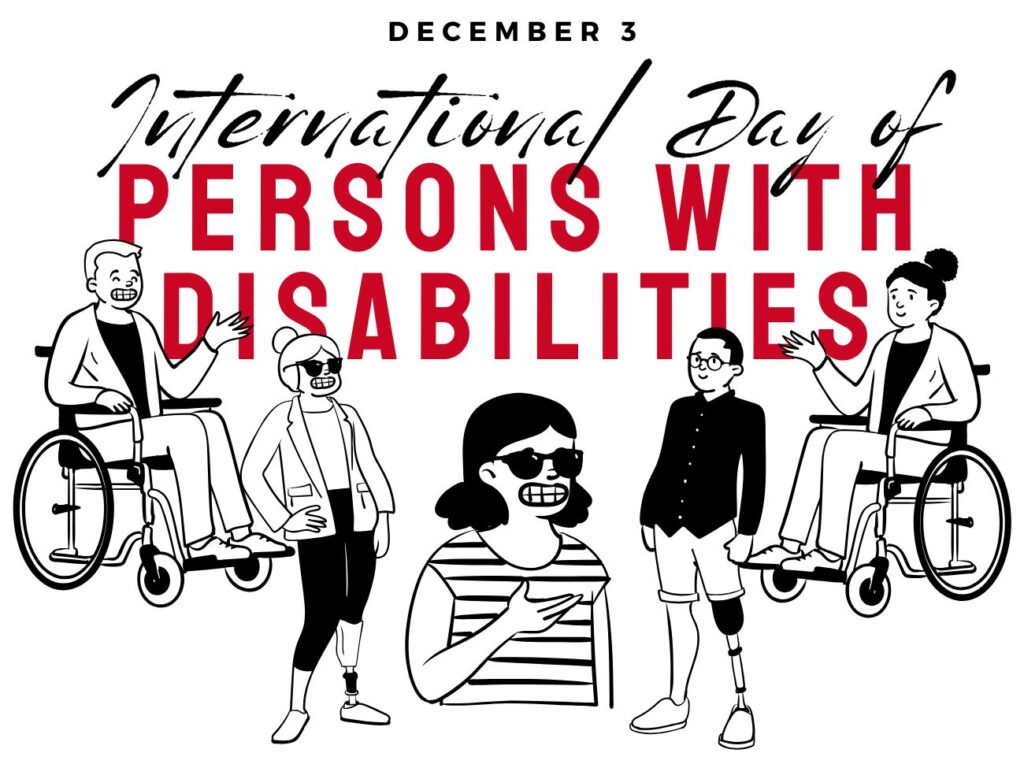

Celebrating Leaders and Trailblazers on International Day of Persons with Disabilities
“International Day of….” Three simple words that precede a vast array of topics and demographics, each enjoying its moment of recognition and celebration. Some of these days verge on the silly or trivial, like “International Day of Awesomeness” (March 10th) or “International Beer Lover’s Day” (August 3rd). Others, such as “International Day of Education” (January 24th) or “International Day of Peace” (September 21st), naturally carry more weight and significance. I’ll admit, though, that I rarely take much notice of these days as they come and go each year.
But today is different. Perhaps I’m biased—disability is such a core part of who I am—but the International Day of Persons with Disabilities isn’t a day I let slip by unnoticed. For me, it’s an opportunity, a pause for reflection. It’s a chance to survey the landscape—both broadly and on a deeply personal, micro level—and ask where we stand (apologies for the pun if you’re a fellow wheelchair user like me).
Where are we in terms of disability rights, accessibility legislation, and inclusiveness? How far have we come, and how far do we still have to go? Societally, writ large, are we still the butt of people’s jokes? Is disability still seen as a valid pretext for an insult?
If I had to distill my answer into a single paragraph, I’d say this: while significant progress has been made—both in improving accessible infrastructure globally and increasing the representation of disability in media—disability remains a minority group that lacks the same protections against verbal discrimination afforded to other demographics. For instance, two people chatting publicly online are far less likely to face backlash, let alone lose their job, if one casually calls the other a “retard” than if they were to use the homophobic f-word slur. As a society, we’ve made incredible strides in shielding many marginalized groups from public prejudice. Yet, I can’t help but notice how rarely disability-related slurs and insults are challenged.
Need another example? A social media trend I’ve observed for quite some time involves mocking little people, portraying them as far smaller than they are, all in the name of “comedy.” This trend has been perpetuated by prominent influencers, with comment sections overflowing with people egging it on, reveling in the so-called humor, and never once questioning whether it constitutes bullying. To me, it’s a glaring reminder of how far we still have to go.
Now, rather than letting this blog post dwell entirely on the negatives, I want to shift the focus to this year’s theme for the International Day of Persons with Disabilities: “Amplifying the leadership of persons with disabilities for an inclusive and sustainable future.”
One leader whose influence continues to reverberate across generations is the late Judy Heumann. Known as the “mother of the disability rights movement,” Judy’s relentless advocacy played a pivotal role in the passage of groundbreaking legislation, such as the Americans with Disabilities Act (ADA) and Section 504 of the Rehabilitation Act. Through her work, she ensured that accessibility and inclusion became not just aspirations but enforceable rights. Judy’s legacy goes far beyond her political achievements—her leadership has inspired countless individuals to embrace their power as advocates, reminding the world that disability rights are human rights.
Another remarkable figure leading the charge for inclusivity is Sinéad Burke. As a disability advocate, writer, and educator, Sinéad has used her platform to challenge perceptions of disability, particularly within industries like fashion and design. Her work emphasizes the importance of accessibility not just as a legal mandate but as an opportunity for creativity and innovation. From her TED Talk, “Why Design Should Include Everyone,” to her advocacy at global events, Sinéad continues to amplify the voices of those with disabilities, ensuring that their leadership and insights are not only heard but also celebrated.
But it’s not just the well-known disabled leaders and trailblazers that I feel proud of and want to celebrate today. Through my work with The World is Accessible, I’ve had the privilege of connecting with countless forward-thinkers and leaders in the disability space, many of whom are integral to our vibrant and inspiring community.
One such leader is Cristina Căluianu, whose passion and dedication were instrumental in shaping why I created The World is Accessible in the first place. Back in 2016, her tour company—Sano Touring—invited me on a tour of Romania, introducing me to some of the incredible landscapes and allowing me to step back in time through the history and culture they shared with me along the way. That journey inspired me to build a community where I could connect others with similarly enriching and accessible opportunities.
Cristina’s contributions to accessibility extend far beyond her role as the founder of Accessible Romania by Sano Touring. She serves as Romania’s National Expert in the European Commission’s #AccessibleEU flagship initiative and is the founder and Board Member of the CED Romania Association, a social enterprise focused on improving accessibility and inclusivity. Most notably, CED Romania has been included in the Zero Project’s 2024 Inclusive Spaces Report for its work on the accessibility of the Water Museum in Timișoara, which features a detailed 3D model to enhance access for people with disabilities. Cristina’s dedication to making the world more inclusive, through both local and international initiatives, exemplifies the spirit of leadership we celebrate on this day.
Then there’s Josh Grisdale, the founder of both tabifolk and Accessible Japan. Originally from Canada, Josh was diagnosed with Cerebral Palsy at just six months old. After immigrating to Japan, he quickly noticed a significant gap in accessibility information available in English. In response, he launched Accessible Japan to document and share detailed accessibility insights across key regions of the country. Later, he founded tabifolk, a dedicated social media platform and forum focused entirely on accessible travel.
Tabifolk features over 80 subgroups, covering everything from accessible RV travel to accessible beaches around the globe, and countless topics in between. It also serves as a hub for the latest accessible travel news, blog posts, and a wealth of resources for travelers with disabilities. Josh inspires me daily with his unwavering drive to empower the disabled community through knowledge and information, enabling people to travel without barriers and with confidence.
Finally, individuals like Sharol Signorelli embody the spirit of grassroots advocacy, combining kindness and altruism with a determined effort to raise awareness about accessible spaces in local communities. As the driving force behind zamonos.com, Sharol has created a platform that empowers users to share detailed accessibility reviews of the places they’ve visited. This collaborative approach provides some of the most comprehensive and nuanced information available, offering insights into a rich array of accessibility features—from wheelchair ramps and braille signage to sensory-friendly environments and dietary accommodations. Sharol’s dedication not only helps build a valuable resource for travelers and locals alike but also fosters a culture of transparency and inclusivity, encouraging businesses and public spaces to embrace accessibility as a priority. Her work exemplifies how one person’s vision can inspire a collective movement, making the world more navigable and welcoming for everyone.
As I reflect on the leaders, advocates, and everyday changemakers who are reshaping the narrative around disability, I feel a renewed sense of optimism and determination. The International Day of Persons with Disabilities is more than just a date on the calendar—it’s a reminder of the progress we’ve made and the challenges we’ve yet to overcome. It’s a call to action for all of us, disabled or not, to amplify the voices of those who have been historically silenced and to ensure that inclusion and accessibility are not afterthoughts but core principles of our future.
Today, let’s honor those who have paved the way, celebrate those who continue to push boundaries, and recognize the power of community in driving meaningful change. Whether through global initiatives, local projects, or even the small but significant act of challenging a harmful stereotype, every step forward matters. Together, we can create a world where the leadership of persons with disabilities is not just amplified on this one day, but every day.
4 thoughts on “Celebrating Leaders and Trailblazers on International Day of Persons with Disabilities”
It is important to recognize the effort of everyone you mentioned, but I will also recognize and celebrate the effort you make, my love.
People with disabilities need to be out and about! No one thinks we exist!
Greetings you all
From Ethiopia Tsegaab Tesfaye my name a disabild person also advocatr and human rights defender. Deborah physical Disabild Christian Ministry Ethiopia leader.
I really appreciate for your vision and mission also what you shearing for us to build for all disabilities community’s equal opportunities.
Nothing us without Us
Ed Roberts was a very talented man who was instrumental in the independent living movement. Surprised he wasn’t noted for his many achievements.